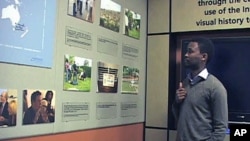With the sentencing this week of two former Rwandan politicians for their role in Rwanda's 1994 genocide, the Tanzania-based International Criminal Tribunal continues its work of trying the masterminds of the violence. In its 17-year history, the tribunal has achieved a number of firsts.
Mathieu Ngirumpatse and Edouard Karemera, president and vice-president of Rwanda’s then-ruling party, will be spending the rest of their lives behind bars for turning a blind eye to the atrocities committed by their party’s youth wing, the Interahamwe.
They join some 21 others currently serving sentences following trials in which they were found guilty of such charges as genocide, war crimes, and crimes against humanity.
Seventeen years ago, the United Nations set up the International Criminal Tribunal for Rwanda to catch the so-called “big fish,” or high-level organizers, of a methodical, systematic campaign aimed at wiping out the Tutsi ethnic group. An estimated 800,000 Tutsis and moderate Hutus were killed during several months in 1994.
Since its beginning, the tribunal has indicted 92 suspects and has passed down judgments against 72 people. These include former government ministers, army commanders, diplomats, journalists, and other Rwandan elite.
Tribunal spokesman, Roland Amoussouga, says the capture and trials of the genocide’s architects have brought about what he calls a “credible and on-going process of national reconciliation and healing” in Rwanda.
“If they were not arrested, God forbid, nobody knows what could have happened to the peace and stability in Rwanda. At the beginning, when they were not all arrested, there was trouble in most parts of Rwanda,” he said.
Amoussouga says the tribunal’s efforts have complemented Rwanda’s justice system.
In Rwanda, one of the most prominent justice activities has been the setting up of traditional `gacaca’ courts to conduct trials of people accused of committing murder, rape, looting, and other crimes during the genocide. An estimated 1.5 million cases have been heard since 2001, mostly at the village level.
The International Criminal Tribunal for Rwanda has achieved a number of firsts. It was the first international court to convict someone of genocide.
On June 24 of this year, the former Minister of Family and Women’s Development, Pauline Nyiramasuhuko, was sentenced to life in prison. Amoussouga says her conviction sets her apart.
“She was indicted for rape as (a) crime of genocide and she was the first woman to be arrested for genocide, for crimes against humanity. All these made her unique,” Amoussouga said.
She was tried alongside her son, who is also now behind bars for life.
Amoussouga says the tribunal has built up, in his words, a “substantial body of jurisprudence” on such concepts as “genocide,” “crimes against humanity,” and “war crimes” that can be used in courtrooms in other jurisdictions. He says the tribunal has also built up an extensive databank of historical evidence of the Rwandan genocide.
But the tribunal has had its share of challenges and criticisms.
Carina Tertsakian is senior researcher at Human Rights Watch in London. She says that the process has been, in her words, “slow and cumbersome,” too bureaucratic, and punctured with many delays.
But, says Tertsakian, the most serious shortcoming is an omission to confront atrocities committed by a rebel group at the time that forms Rwanda’s current government.
“One aspect in which it (the tribunal) has failed is to prosecute cases of crimes committed by the Rwanda Patriotic Front, the ruling power currently in power in Rwanda. The Rwandan government has put very, very heavy pressure on the various ICTR prosecutors over the years to drop investigations into RPF crimes, and one by one, sadly, they have succumbed to that,” Tertsakian said.
At the end of 2008, Human Rights Watch sent the tribunal’s prosecutor, Justice Hassan B. Jallow, a letter urging the court to investigate reports of revenge killings of thousands of civilians by the Rwandan Patriotic Front.
The tribunal is set to wind up its work in 2014.
Rwanda Criminal Tribunal Pleased With Progress




